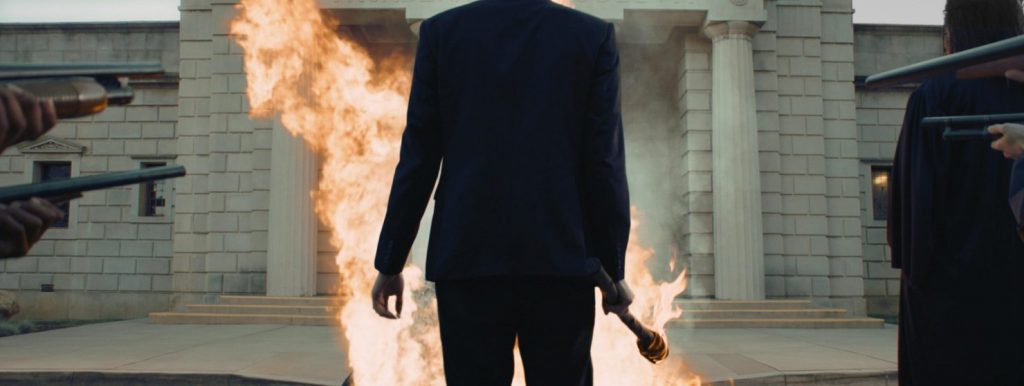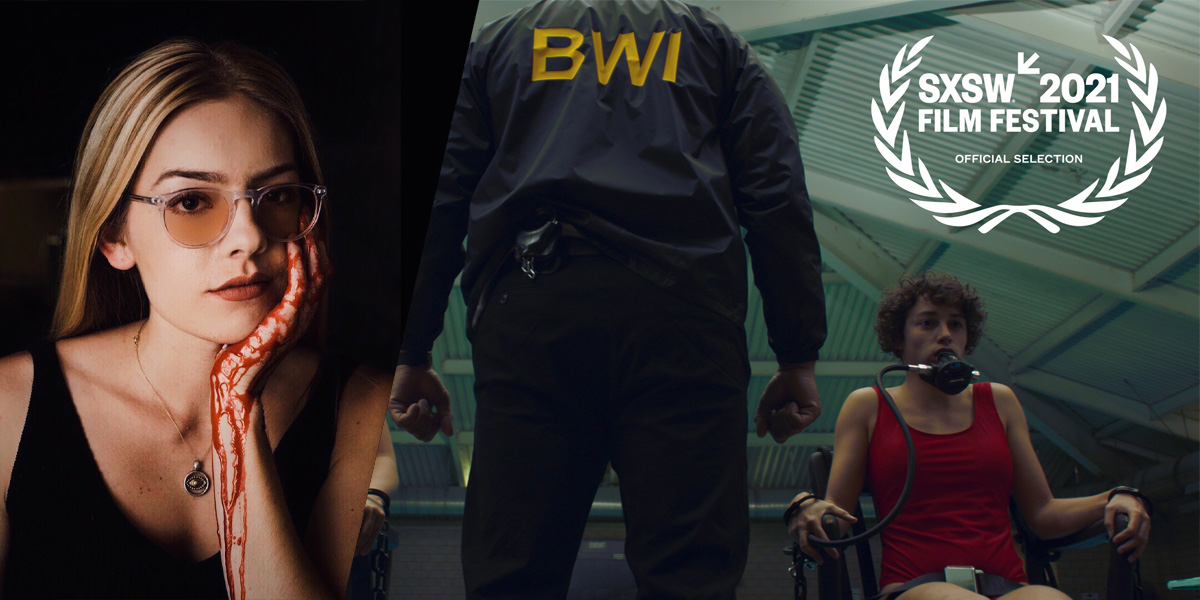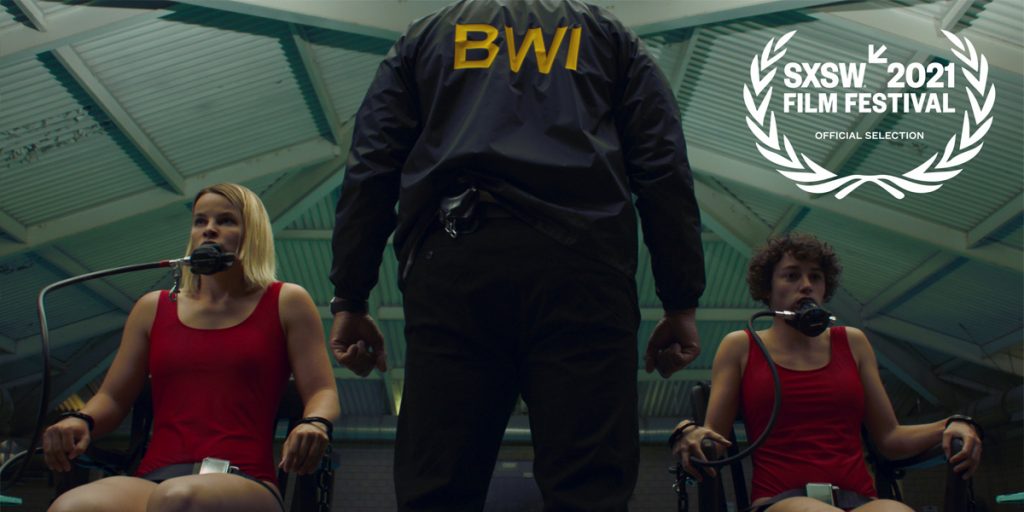Witch Hunt skillfully balances sharp social commentary with sincerely shocking scares, making this a must-see for genre fans.
As stated at the start of Witch Hunt, this term has taken on two meanings throughout the course of history thus far – both of which prove to be essential to understanding the true message of writer-director Elle Callahan’s (Head Count) movie. At face value, a witch hunt can most simply be described as “a search for, and subsequent persecution of, persons accused of witchcraft,” which of course calls to mind the chaos of the infamous Salem Witch Trials. However, in recent decades, a less literal definition has emerged – “a campaign directed against a person, or group, holding unorthodox or unpopular views, usually based on slight, doubtful, or irrelevant evidence.” Hunts such as these come from both sides of the political aisle and originate in a number of subcultures in society, but one thing has become quite clear amidst all of this conflict – misinformation is more prevalent and more popular than ever, and lies about minority or disenfranchised groups have been legitimatized to a deadly degree.
With Witch Hunt, Callahan merges these two meanings to form the terrifying thematic throughline of her fantasy thriller, a film that takes place in a modern America, much like today, only with one distinct difference – witches are real, and witchcraft is illegal. We further become familiar with the specifics of this setting through the perspective of Claire (Gideon Adlon, of Blockers and The Craft: Legacy), a sheltered teen who holds her prejudices against practicing witches, even though these convictions run contrary to those of her mother Martha (Elizabeth Michell, of The Purge: Election Year and The Santa Clause 2), who regulates an “Underground Railroad”-esque operation for witches evading law enforcement and seeking to cross the southern border to reach asylum in Mexico. And yet, when two witch sisters named Fiona (Abigail Cowen, of Netflix’s Fate: The Winx Saga and I Still Believe) and Shae (newcomer Echo Campbell) arrive to temporarily stay with the family, Claire’s burgeoning friendship with Fiona causes her to question her beliefs – as do her own potential proclivities towards witchcraft that start to surface.
Right off the bat, it’s apparent that Witch Hunt has plentiful parallels to hot-button topics in 21st Century politics – persecution and demonization of “the other,” crossing over to another country to find freedom, etc. – and instead of merely making these connections and moving on, Callahan efficiently engages with the similarities between her story and this real-world strife in her script, integrating these two realities in a way that brilliantly blends fact and fiction. In doing so, Callahan calls on audiences to interrogate their own ingrained biases, just as Claire has to when first meeting Fiona and Shae – for those who incessantly moan over the millions of “illegal immigrants” entering the United States each and every day, how would they feel if the individuals experiencing this enmity were two red-headed white girls instead?

Because Fiona and Shae are being sought out solely due to their “witchy” genealogy – a characteristic of their identity that is out of their control – obvious comparisons arise between their struggles and the suffering endured by individuals of diverse races and ethnicities for similarly irreversible aspects of their selfhood. However, an additional allegory seems to arise from Claire’s conundrum in particular. For so long, Claire has viewed witches with vitriol, but after meeting these two sisters and subsequently discovering “darker” parts of her own personality, Witch Hunt also suggests a synonymity between witchhood and queerness – and this symbolism is further studied as Claire and Fiona develop a deep bond (which includes intense discussions on the famously queer-coded Thelma & Louise) and Claire embraces those pieces of her psyche that formerly horrified her. Though never made explicit, this stirring subtext adds rich resonance to Witch Hunt as a whole.
Throughout the film, Callahan also capably demonstrates that her direction is just as distinguished and dynamic as this thoroughly textured storytelling, ingeniously incorporating harrowing horror imagery into scenes of both authentic and imaginary peril. Claire’s numerous nightmares about occult apparitions are sufficiently spine-chilling – showcasing the startling stories she’s heard about witches her entire life and accentuating the anxiety she feels at possibly having these powers herself – and cinematographers Nico Aguilar (Countdown, The Glorias) and Tommy Oceanak (MotorTrend’s Engine Masters) assist Callahan by engulfing us in this eerie environment, while Canadian composers Blitz//Berlin (The Void, Psycho Goreman) provide a petrifying score that further heightens our fears.
The worldly woes that Callahan catches on camera typically come from the hawkish Detective Hawthorne (Christian Camargo, of The Hurt Locker and The Twilight Saga: Breaking Dawn – Part 2), an aggressive government agent who sets his sights on Martha and her “suspicious operation,” and Callahan infuses each and every one of his scenes with a striking intensity that causes you to catch your breath, even when you least expect it (which is also a testament to Camargo’s palpably intimidating presence in the role). However, Witch Hunt’s standout sequence has to be its mid-film “sink-or-swim” test. In schools, all girls female students are regularly checked for “witch” characteristics, and for the unfortunate souls that fail, they are then subjected to a procedure in which they are submerged underwater for a prolonged period of time so government officials can see if any witches rise to the surface. As Claire watches four of her classmates go through this torture, Callahan’s command over the cruelty of this “inspection” is immensely impactful.
Witch Hunt’s ensemble cast is excellent across-the-board, with Adlon anchoring the entire affair with her honest humanity and a resounding relatability. Her evolution as a character as she abandons her animosity towards witches is compelling and credible the whole way through, and that’s entirely due to the believability Adlon brings to the part. Mitchell is a real ray of sunshine in such a solemn story, and she too truly sells Martha’s commitment to this cause (especially when her true intentions are explored in the film’s finale). Finally, Cowen’s Fiona is a formidable foil for Adlon’s Claire, and she carries herself with a combination of concern and courage at all times, never shying away from Fiona’s fear about being caught but also effortlessly emphasizing her endearing will to survive.
Witch Hunt is a rather small-scale story for the scopious scenario it sets up, but because Callahan’s final product here is so spectacularly satisfying, we’re left wanting to see even more of these characters’ exploits instead of feeling “cheated” in any capacity. Thanks to a commendable cast that helps keep the fantasy grounded in feasibility with their tenderly powerful performances and Elle Callahan’s fierce filmmaking both behind the camera and through her skillful screenwriting, Witch Hunt is a win for genre fans who savor smarts along with their scares – and hopefully a call to film studios everywhere to provide Callahan with bigger budgets and richer resources in the very near future to further spotlight her talents.
Witch Hunt had its World Premiere at SXSW Online on March 17, 2021 and is now available to watch on digital and on demand.

 loudandclearreviews.com
loudandclearreviews.com
